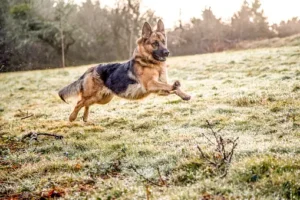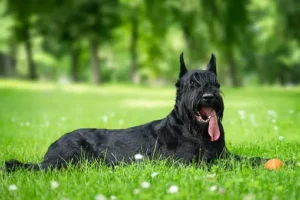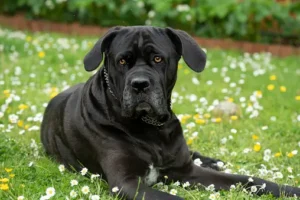Best guard dog breeds, selecting the right guard dog breed to protect your house and family depends on various factors including the dog’s temperament, training, and your specific needs. Here’s a list of ten popular guard dog breeds known for their protective instincts:
German Shepherd As Best Guard Dog Breeds:

The German Shepherd is a versatile and intelligent dog breed renowned for its exceptional qualities as a working and family companion. Originating in Germany in the late 19th century, these dogs were initially bred for herding and guarding sheep, but their remarkable capabilities soon led them to various roles.
With a striking appearance characterized by a well-proportioned body, erect ears, and a bushy tail, the German Shepherd exudes confidence and strength. Their thick double coat comes in a variety of colors, with the classic black and tan being the most recognizable.
What truly sets the German Shepherd apart is its intelligence and trainability. These dogs have an innate desire to learn and excel at tasks, making them a favorite among trainers and handlers. Their ability to understand complex commands and respond quickly makes them ideal candidates for roles that demand problem-solving and quick decision-making, such as police or search and rescue work.
Beyond their working capabilities, German Shepherds are known for their loyalty and devotion to their families. They often form strong bonds with their human companions and are protective by nature. This protective instinct, coupled with their sharp senses and vigilance, makes them excellent guard dogs.
However, owning a German Shepherd comes with responsibilities. They are high-energy dogs that require regular exercise, mental stimulation, and socialization from an early age. Without proper outlets for their energy, they can develop behavioral issues.
In terms of health, German Shepherds are prone to certain genetic conditions, such as hip and elbow dysplasia. Responsible breeding practices and regular veterinary care are crucial to maintaining their well-being.
Rottweiler As Best Guard Dog Breeds:

The Rottweiler, a robust and imposing breed, is renowned for its powerful physique, intelligence, and protective nature. Originating in Germany, these dogs were historically used to drive cattle and guard livestock. Over time, their loyalty and protective instincts made them valued as family protectors and working dogs.
Physically, Rottweilers are characterized by their muscular build, broad chest, and distinctive black and tan coat. Their deep-set eyes exude an air of confidence and vigilance. While their appearance might be intimidating, Rottweilers are often described as gentle giants when properly raised and socialized.
One of the most notable traits of Rottweilers is their unwavering loyalty to their families. They form strong bonds and are known to be especially protective of children. This trait, coupled with their natural territorial instincts, makes them excellent guard dogs. Rottweilers are instinctively wary of strangers, which can translate into a vigilant and protective demeanor when guarding their home and loved ones.
While their protective nature is an asset, early and consistent training is essential to harness their potential responsibly. Rottweilers are intelligent and quick learners, which can be both a boon and a challenge for owners. Positive reinforcement training methods are often recommended to ensure a well-rounded, well-behaved, and obedient companion.
Like all breeds, Rottweilers have their health considerations. Hip and elbow dysplasia, heart issues, and certain types of cancers are among the potential concerns.
Doberman Pinscher As Best Guard Dog Breeds:

The Doberman Pinscher, commonly referred to as the Doberman, is a striking and powerful breed known for its elegance, loyalty, and protective nature. Developed in the late 19th century by a German tax collector named Karl Friedrich Louis Dobermann, this breed was originally intended to be a versatile guardian and working dog. Today, the Doberman is cherished as a loyal companion, an efficient guard dog, and even a skilled service animal.
Physically, Dobermans are notable for their sleek, muscular build, which exudes strength and agility. Their short coat can come in a variety of colors, including black, red, blue, and fawn. Their distinctive look is accentuated by their cropped ears and docked tails, although these practices are becoming less common due to animal welfare concerns.
Beneath their imposing exterior, Dobermans possess a temperament that’s a balanced blend of loyalty, intelligence, and protectiveness. They are fiercely devoted to their families, often forming deep bonds with their human companions. Their intelligence and eagerness to please make them highly trainable, and they excel in various roles, including police work, search and rescue, and therapy assistance.
As guard dogs, Dobermans shine. Their natural protective instincts combined with their imposing appearance often serve as a deterrent to potential intruders. However, early socialization and proper training are crucial to ensure that their protective nature doesn’t become overly aggressive or unmanageable. When raised in a loving and structured environment, Dobermans can be gentle and affectionate with their families while still being effective protectors.
While Dobermans have a reputation for guarding, they are also known for their sensitivity and need for human interaction. They thrive when they are included in family activities and given ample mental and physical stimulation. Neglect or isolation can lead to behavioral issues, so a dedicated owner willing to invest time and effort into their Doberman’s well-being is essential.
The Alpine Dachsbracke: 10 Most Important Things
Bullmastiff As Best Guard Dog Breeds:

The Bullmastiff, a majestic and powerful breed, is a combination of the Bulldog and the Mastiff, resulting in a dog that possesses both strength and loyalty. With a history rooted in England, this breed was originally developed to assist gamekeepers in guarding large estates from poachers. Their imposing presence and protective instincts make them excellent guard dogs, while their gentle nature endears them to their families.
Standing at around 24 to 27 inches (61 to 68 cm) at the shoulder and weighing between 100 to 130 pounds (45 to 59 kg), Bullmastiffs are imposing in stature. Their short coat, typically fawn, red, or brindle, requires minimal grooming. However, their muscular build and determined expression are what truly define their appearance.
What sets Bullmastiffs apart is their unique blend of strength and gentleness. While their size and appearance can be intimidating, they are remarkably gentle and affectionate with their families. They form strong bonds and are particularly patient and protective with children. This temperament makes them well-suited for families seeking a loyal and reliable guardian.
As natural protectors, Bullmastiffs have an inherent instinct to guard their homes and loved ones. They are watchful and reserved around strangers, often assessing situations before taking action. However, they are not inherently aggressive and tend to only react if they sense a genuine threat.
To harness their protective instincts effectively, Bullmastiffs require early socialization and training. Positive reinforcement methods are essential to ensure their obedience and well-rounded behavior. Regular exercise is also important to maintain their physical health and mental stimulation.
While the Bullmastiff’s primary role historically was guarding estates, they have evolved into cherished family companions today. Their balanced nature makes them excellent choices for families seeking a devoted protector that is also gentle and affectionate. Responsible ownership and proper training are key to unlocking the full potential of this remarkable breed, allowing them to excel both as guardians and loving members of the household.
Belgian Milionis As Best Guard Dog Breeds:

The Belgian Milionis, a breed often mistaken for the German Shepherd due to their similar appearance, is a remarkable and versatile working dog known for its intelligence, agility, and strong protective instincts. Originating from Belgium, they were originally bred for herding and guarding livestock. However, over time, their exceptional qualities have made them a preferred choice for various roles including police, military, and search and rescue work.
Standing at around 22 to 26 inches tall and weighing between 40 to 80 pounds, the Belgian Milionis possesses an elegant yet muscular build that enables them to excel in physically demanding tasks. Their short coat, typically fawn to mahogany in color, is low-maintenance and provides them with a sleek and functional appearance.
One of the standout features of the Belgian Milionis is their high level of intelligence. This intelligence, combined with their boundless energy, makes them ideal candidates for advanced training and specialized tasks. Their natural protective instincts and loyalty to their families also make them excellent guard dogs.
However, their intelligence and energy can sometimes pose challenges for inexperienced owners. Without proper training, socialization, and outlets for their energy, they might develop behavioral issues. Regular exercise, mental stimulation, and engaging activities are essential to keep them content and well-behaved.
In addition to their working roles, Belgian Milionis can also make wonderful companions for active and dedicated families. They bond deeply with their human counterparts and form strong attachments, often becoming a fiercely loyal and protective presence in the household.
Giant Schnauzer As Best Guard Dog Breeds:

The Giant Schnauzer, a robust and imposing breed, stands as a testament to its versatility as both a dedicated guardian and a loyal companion. With a distinctive appearance characterized by a dense, wiry coat, bushy eyebrows, and a commanding presence, these dogs have captured the hearts of many families seeking a reliable protector.
Originally hailing from Germany, the Giant Schnauzer was bred to be a working dog, herding livestock and guarding property. This heritage has endowed the breed with innate protective instincts and a keen sense of awareness, making them exceptional guard dogs. Their size, strength, and natural suspicion of strangers contribute to their prowess as deterrents against potential threats.
Beyond their protective nature, Giant Schnauzers exhibit remarkable intelligence and a strong desire to please their owners. This combination of qualities makes them highly trainable and adaptable to various roles, from household guardian to agility competitor. However, due to their intelligence, they require consistent mental stimulation and training to prevent boredom-driven behaviors.
While their exterior might exude an air of seriousness, Giant Schnauzers also possess a playful and affectionate side when within the circle of their families. They often form deep bonds with their human companions, displaying loyalty and devotion that is heartwarming to witness. Proper socialization from an early age is crucial to ensure their comfort around unfamiliar people and animals.
Their dense, double-layered coat requires regular grooming to maintain its texture and appearance. This task, although demanding, also serves as an opportunity for bonding between the dog and its owner.
Boxer As Best Guard Dog Breeds:

The Boxer, a medium-to-large breed with boundless energy and an unmistakable appearance, is a beloved canine companion known for its affectionate nature and strong protective instincts. Originating in Germany, Boxers were initially bred as working dogs, combining strength, agility, and intelligence. Today, they are cherished family members and popular choices for households seeking a loyal and active four-legged friend.
With their distinctive square muzzle, strong jaws, and powerful build, Boxers exude a sense of strength and confidence. Their short coat comes in various colors, most commonly fawn or brindle, and their expressive dark eyes radiate warmth and intelligence.
What truly sets Boxers apart is their playful and energetic personality. They are known for their “kid-like” behavior, often being referred to as the “Peter Pan” of dog breeds due to their perpetual youthfulness. They thrive on human interaction and have an innate ability to forge deep bonds with their families, including children. However, their exuberance can sometimes be overwhelming for those unprepared for their high activity levels.
Boxers are more than just playful companions; they’re also natural guardians. Their loyalty to their family runs deep, and they’re not hesitant to show their protective side when they sense a threat. While their friendly demeanor might not immediately project the image of a guard dog, they have an uncanny ability to discern between normal interactions and genuine dangers, making them effective deterrents.
Training and socialization are key factors in harnessing the Boxer’s potential as a well-rounded companion. Early socialization is crucial to ensure they develop into confident and well-mannered adults.
Hyena: 15 Amazing Points Will Surprise You
Akita As Best Guard Dog Breeds:

The Akita is a majestic and powerful breed with a rich history and a striking appearance. Originating from Japan, these dogs have long been celebrated for their loyalty, courage, and protective nature. Akita’s were initially bred for guarding royalty and nobility, as well as hunting large game such as bears.
One of the most distinctive features of the Akita is its appearance. They have a strong, muscular build, a dense double coat that comes in various colors, and a curled tail that rests over their back. Their broad head is crowned with erect, triangular ears that contribute to their alert expression. Akita’s eyes are small, dark, and deeply set, enhancing their dignified and formidable demeanor.
Akita’s possess a unique combination of traits that make them both devoted family members and formidable guardians. They are known for their loyalty and affection towards their families, often forming strong bonds with their owners. However, their protective instincts are especially pronounced, making them excellent watchdogs. Akita’s are naturally cautious around strangers and tend to be reserved, which adds to their effectiveness as guard dogs.
Training and socialization are essential for Akita’s to thrive as well-rounded companions. Early exposure to different people, animals, and environments helps prevent excessive shyness or aggression. Akita’s are intelligent dogs that respond well to positive reinforcement training techniques, although their independent nature might require patient and consistent guidance.
Due to their size, strength, and protective instincts, Akita’s require a responsible and experienced owner who can provide appropriate training and care. While they can be gentle and loving within their families, their guarding nature can sometimes lead to aggression if not properly managed. It’s crucial to establish clear leadership and boundaries while ensuring they are treated with respect and kindness.
Cane Corso As Best Guard Dog Breeds:

The Cane Corso, a majestic and muscular breed hailing from Italy, is a remarkable guardian and loyal companion. With a history rooted in ancient Roman times, these dogs were bred for various tasks, including guarding property, hunting, and working alongside their human counterparts. The Cane Corso’s name itself reflects its multifaceted role: “Cane” meaning dog and “Corso” likely referencing the breed’s Roman origins.
Physically, the Cane Corso is a commanding presence. With a robust and athletic build, they possess a distinctive broad head, a powerful jawline, and a short, dense coat that can come in various colors including black, gray, and fawn. Their ears are traditionally cropped, adding to their distinctive appearance, although this practice is becoming less common in many parts of the world.
Beneath their impressive exterior lies a loyal and protective temperament. Cane Corso are known for their devotion to their families and their natural instinct to guard. They are naturally suspicious of strangers, making them effective deterrents to potential intruders. While they exhibit a strong protective nature, they are also known to be affectionate and gentle with their families, especially when properly socialized from a young age.
To ensure that a Cane Corso develops into a well-rounded and well-behaved companion, early socialization and training are imperative. Due to their intelligence and desire to please their owners, Cane Corso are highly trainable. Positive reinforcement methods are particularly effective in shaping their behavior and fostering a strong bond between the dog and its family.
Cane Corso require regular exercise to maintain their physical and mental well-being. Engaging in activities such as daily walks, play sessions, and even more advanced training exercises can help channel their energy in a positive direction.
While the Cane Corso’s imposing presence and protective nature make them ideal guard dogs, it’s important to note that responsible ownership is paramount. Adequate training, socialization, and proper care are essential for fostering a well-adjusted and trustworthy companion. With the right environment and guidance, the Cane Corso can excel as both a protective guardian and a loving family member.
Rhodesian Ridgeback As Best Guard Dog Breeds:

The Rhodesian Ridgeback, often referred to as the “African Lion Hound,” is a distinctive and versatile breed known for its courage, loyalty, and remarkable history. Originating in Southern Africa, specifically in what is now Zimbabwe, these dogs were bred by indigenous tribes to be expert big-game hunters, capable of confronting and holding lions at bay until hunters could arrive. This unique heritage has shaped the breed into a fearless and protective guardian with a strong instinct to defend its family and territory.
One of the most notable features of the Rhodesian Ridgeback is the ridge of hair along its back that grows opposite to the rest of the coat, creating a distinct pattern. This ridge, which gave the breed its name, is a mark of its heritage. With a muscular build and an elegant yet strong appearance, Ridgebacks possess an aura of dignity and confidence.
Despite their history as hunters, Ridgebacks are known for their gentle and affectionate demeanor towards their families. They are often described as being independent thinkers and may display a reserved attitude towards strangers, which makes them excellent watchdogs. However, proper socialization from a young age is crucial to ensure they are well-adjusted and comfortable in various situations.
While Rhodesian Ridgebacks can make loyal and protective companions, they require consistent training and mental stimulation. Early socialization with people and other pets is essential to prevent aggression or excessive shyness. Engaging them in physical activities like long walks, runs, or play sessions is vital to keep them physically fit and mentally engaged.
FAQ’s:
What are guard dogs, and why are they important?
Guard dogs are breeds specifically trained to protect people, properties, and possessions. They serve as deterrents and provide security by alerting their owners to potential threats. Guard dogs play a crucial role in enhancing safety and security.
What traits should I look for in a good guard dog breed?
The best guard dog breeds usually possess traits such as loyalty, courage, intelligence, alertness, and a strong protective instinct. They should also be trainable and obedient, making them effective in responding to commands.
What are some examples of the best guard dog breeds?
Several dog breeds are renowned for their guarding abilities. Some of the best guard dog breeds include the German Shepherd, Rottweiler, Doberman Pinscher, Bullmastiff, and Belgian Milionis. These breeds are known for their protective nature and ability to assess threats.
Do guard dogs require special training?
Yes, guard dogs require specific training to harness their protective instincts effectively. Professional training is recommended to ensure they respond appropriately to various situations, differentiate between actual threats and non-threats, and behave well around people and other animals.
Are guard dogs suitable for families with children and other pets?
While many guard dog breeds can be excellent family companions, it’s crucial to choose a breed that is known for being good with children and other pets. Proper socialization from a young age is essential to ensure that the dog is comfortable and behaves appropriately around all family members, including kids and other animals.


